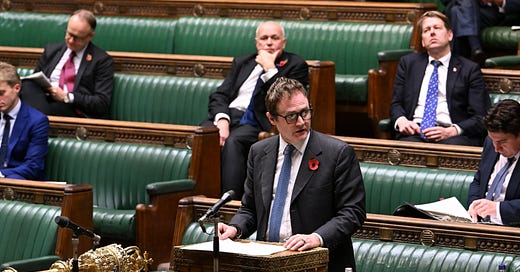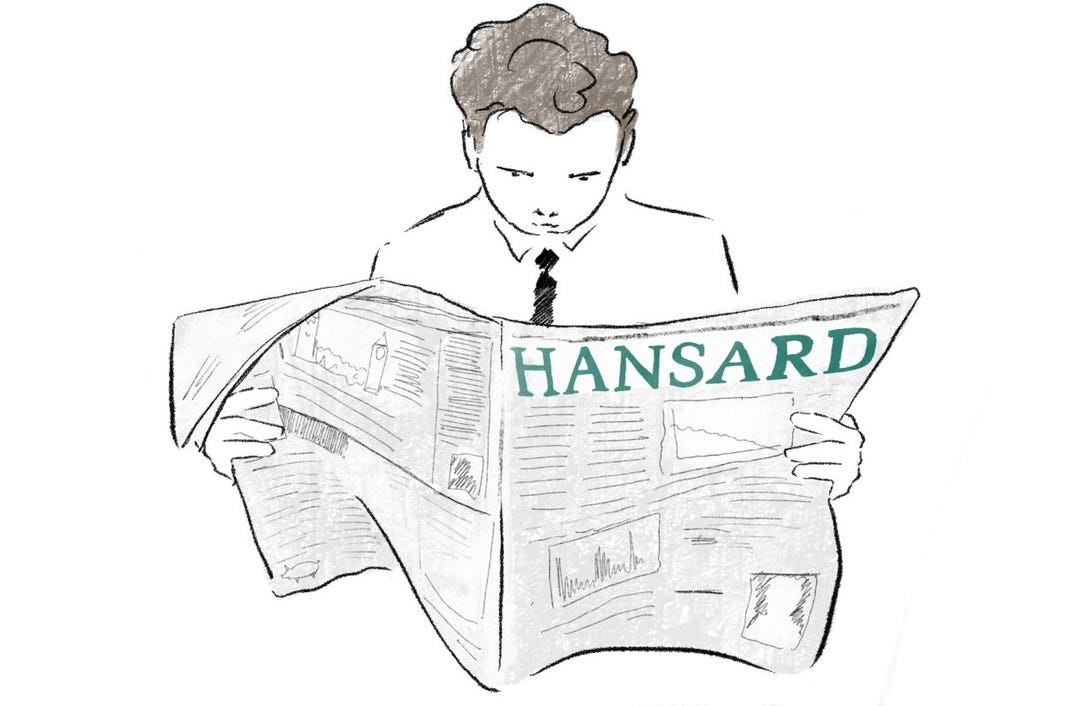Minister to visit Taiwan, Removing Confucius Institutes, strategic dependency and supply chains, TikTok
A Beijing to Britain briefing note
Hello,
“We must work with our democratic allies to help shape the international order of the future. With free trade forged at its heart.” That was the assessment of Greg Hands, Britain’s Minister of State for Trade Policy, in a fascinating speech delivered at Chatham House a handful of days ago. How far should trade be used as an acceptable geopolitical tool for this Government to influence the direction of global travel? And what are the best ways of doing this? Ruminating on this, a group of influential MPs have decided the British Government needs to publish a “single coherent trade document”. The International Trade Committee want this overarching strategy to take into account “key foreign-policy issues such as the Government’s approach to human rights and the UK’s geopolitical relationships”, both areas that often cause friction in the context of trade.
We are seeing this friction between human rights, economic security and trade play out in real time with German Chancellor Olaf Scholz’s visit to China. The first G7 leader to arrive in Beijing in nearly three years, Scholz touched down at the head of a delegation of German businesses. His visit has attracted a fairly wide range of Western criticism, from human rights activists, who believe it sends the wrong signal given the Chinese Communist Party’s actions in Xinjiang and elsewhere, to policymakers, who argue Germany is weaning itself off economic dependence on one authoritarian power, only to swap it for another. British officials will be watching closely to see how effectively economic pragmatism really works in this new era, and what successful outcomes Scholz was able to achieve away from the negative optics.
Finally, something different. As some of you may have seen, Substack (the platform which delivers these briefings) has an app. It’s much more aesthetically pleasing than an email inbox when it comes to reading. Anyway, this app now has a chat function. Throughout next week, Beijing to Britain will be testing sharing articles and snippets of news that are of interest - for example, this letter from MPs asking for the Government to outline its China Strategy, or this readout of Prime Minister Prime Minister Rishi Sunak’s call Japanese Prime Minister Fumio Kishida.
Order! Order!
Some of the more eye-catching questions and tweets from Westminster dwellers this week
Gregory Campbell (Shadow DUP Spokesperson (International Development), Shadow DUP Spokesperson (Cabinet Office)) asked “the Secretary of State for the Home Department, whether she has received any evidence of the Chinese government operating unofficial police stations in the UK.
Stewart McDonald (SNP Spokesperson for Defence & Member of the Foreign Affairs Committee) tweeted “Delete TikTok.”
Lord Bowes asked “His Majesty's Government what assessment they have made of the implications of being a shareholder in Eutelsat together with the government of China.”
Rob Butler (Conservative, vice-chair of the Taiwan APPG) tweeted “A very useful briefing from Rep Hsieh and colleagues @Taiwan_in_UK on the current security situation in the Taiwan Strait. It is imperative that we support the Taiwanese people to determine their own future, free from the threat of a brutal invasion by China. #StandWithTaiwan”
Politics
Confucius Institutes and national security
When it rains it pours
On Tuesday, the co-founder of the China Research Group (CRG) and now Security Minister Tom Tugendhat took part in a marathon session in the Commons. That morning, his successor at both the Foreign Affairs Committee and CRG, Alicia Kearns, was granted an Urgent Question on the legal status of Overseas Chinese Police Stations in the UK, with Tugendhat acting as the Government’s representative. Kearns also penned a letter in her capacity as Chair of the FAC asking the Government for an update on the Manchester incident, and for clarity around the Sunak Government’s approach to China. Read it here.
MPs from all parties packed the Commons, accusing the Government of not moving fast enough on this issue and pushing for an update around these stations. Tugendhat demurred that it was under investigation by the Government, and he could not provide further detail at this stage due to legality issues, but noted that “there is no police force in this country that has jurisdiction except the police forces of the United Kingdom”. Veteran MP Dr Julian Lewis (who Chairs the secretive Intelligence and Security Committee) asked Tugendhat to “explain the criteria under which a so-called diplomat found guilty of a criminal assault would be declared persona non grata,” while a number of others also asked substantial questions responded to with little new in terms of substance.
The most newsworthy segment of the debate came when IPAC’s Iain Duncan Smith pushed Tugendhat on “kick[ing] out” Confucius Institutes. The Security Minister responded “I also remind him of the Prime Minister’s pledge during the leadership race only a few months ago that Confucius Institutes pose a threat to civil liberties in many universities in the United Kingdom and he will be looking to close them,” which generated a number of headlines. Interestingly, ALBA Party Leader and Former First Minister of Scotland Alex Salmond released a long statement attacking the Government, saying “This is the sort of Cold War mentality on display by Westminster which ends in hot wars. The Scottish Government should defend these valuable cultural exchanges and oppose any attempts by the UK Government go close them down. We have nothing to fear from talking and exchanging culture. The real danger is from those who wish to divide the world into armed camps and who wish to shut Scotland out from the international community.” China’s Global Times’s analysis was that “Tugendhat himself is one of the most prominent proponents of anti-China sentiment among British political circle (sic)… It's clear that the chief of the UK's security sector is deliberately stirring up trouble.”
Immediately after fielding the Urgent Question, Tugendhat gave a statement on national security. This set out a handful of things worth noting. The Security Minister positioned that “our economic security guarantees our economic sovereignty just as our democratic security guarantees our freedom. The advanced technologies that our rivals have spent time and money developing have levelled the field and made us more vulnerable.” He then announced “that the Prime Minister has asked me to lead a taskforce to drive forward work to defend the democratic integrity of our country. The taskforce will work with Parliament, Departments, the security and intelligence agencies, the devolved Administrations and the private sector. It will work to better protect the freedoms and institutions we hold dear…The work of this Taskforce will report into the National Security Council and more details will be set out in the update of the integrated review…It will be cross-departmental and inter-agency, and I will be inviting cross-party co-operation.”
Shadow Home Secretary Yvette Cooper agreed in principle to the idea, but only if the Government “show us that there is some kind of grip at the heart of this Government on attitudes towards security. When we have one Prime Minister who puts security at risk to go to Italy for a party, another who allegedly used a personal phone for contacting Government Ministers, and a third who is defending his predecessors and reappointing as Home Secretary someone described on the Government’s own Back Benches as “leaky”, that undermines our national security. Our national security is too important for this kind of chaos, so what will the Minister do to ensure that the Government get a grip?” The theme of a Government-wide lax approach to security was touched on at length throughout the rest of the statement, with Gavin Williamson’s Huawei fiasco getting a brief mention.
While we can learn little from Tugendhat’s statement, it’s critical to view it as fitting into a wider, changing security landscape. This new Government is still trying to assess how it understands and acts on national and economic security in relation to foreign actors and new threats, principally with China in mind. The National Security Bill and the Economic Crime and Corporate Transparency Bill will give us further insight, but in the meantime, there’s still little clarity as to how Downing Street plans to deal with issues such as the Manchester incident, where it has defaulted to the line “If the police determine there are grounds to charge any officials, we would expect the Chinese consulate to waive immunity for those officials.” (despite IPAC’s Duncan Smith keeping the pressure on.) The machinery around state security is likewise changing - this week there is talk that Prime Minister Rishi Sunak is considering taking the decision-making process around the control of overseas investments in sensitive sectors away from the Business Department and into the Cabinet Office/Downing Street.







